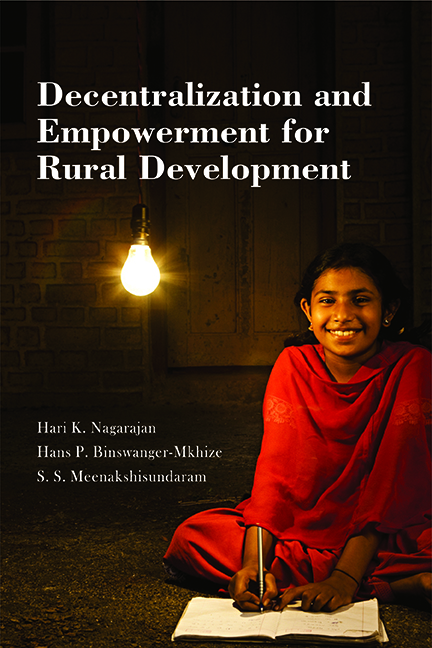Book contents
- Frontmatter
- Contents
- List of Tables and Figures
- Foreword 1
- Foreword 2
- Preface
- 1 Introduction
- 2 Decentralization: Cross-country Experiences
- 3 Thinking about Decentralization in India: 73rd Amendment and Beyond
- 4 Literature
- 5 An Overview of the Data
- 6 Analytical Approaches and Econometric Methods Used
- 7 Can Panchayats Improve the Quality of Services? Some Qualitative Evidence
- 8 Impact of Political Reservations for Women in Panchayats
- 9 Importance of Individual Empowerment of Women
- 10 Governance, Service Provision and Development Outcomes
- 11 The Impact of Fiscal Grants on Tax Efforts of Village Panchayats
- 12 Incidence of Identity-based Voting and Bribes in Panchayats
- 13 Panchayats and Household Vulnerability
- 14 Key Findings, Conclusions and Policy Recommendations
- References
- Index
- About the Authors
1 - Introduction
Published online by Cambridge University Press: 30 November 2022
- Frontmatter
- Contents
- List of Tables and Figures
- Foreword 1
- Foreword 2
- Preface
- 1 Introduction
- 2 Decentralization: Cross-country Experiences
- 3 Thinking about Decentralization in India: 73rd Amendment and Beyond
- 4 Literature
- 5 An Overview of the Data
- 6 Analytical Approaches and Econometric Methods Used
- 7 Can Panchayats Improve the Quality of Services? Some Qualitative Evidence
- 8 Impact of Political Reservations for Women in Panchayats
- 9 Importance of Individual Empowerment of Women
- 10 Governance, Service Provision and Development Outcomes
- 11 The Impact of Fiscal Grants on Tax Efforts of Village Panchayats
- 12 Incidence of Identity-based Voting and Bribes in Panchayats
- 13 Panchayats and Household Vulnerability
- 14 Key Findings, Conclusions and Policy Recommendations
- References
- Index
- About the Authors
Summary
Alleviating poverty and improving the living standards especially of the rural poor has been high on the agenda of many developing countries. Despite specific programmes for economic and social development, a substantial number of poor people continue to live in appalling conditions in these countries. Experts who find nothing wrong with the design of these programmes, therefore, focus their attention on the suitability of delivery mechanisms. Some of them feel that the administrative set-up in these countries is not really conducive to promote welfare as targeting is poor and delivery is clumsy. Ensuring people's participation in the implementation of development programmes is considered a better alternative to deliver benefits as well as essential services to the poor.
The past few decades have seen an increasing trend wherein developing countries are reducing their barriers to trade and embarking on a process of domestic reforms. However, there is a concern that such a process could exacerbate the economic and social inequalities within these countries. In order to minimize the adverse consequences of trade and other economic reforms, many governments have started promoting inclusive growth as a mechanism for achieving many of their goals for economic development. From this angle also, decentralization and devolution of powers to elected local governments that could eventually lead to local self-governance is often thought of and prescribed as a tool for achieving growth.
Decentralization which, by design, ensures people's participation in planning and governance is also looked upon as an efficient instrument for reaching benefits to the people with least costs. Accountability and transparency, the cornerstones of decentralized governance, are expected to ensure minimization of misidentification of beneficiaries, better enforcement relating to asset acquisition, its retention and maintenance, capital plough-back, better provision of services etc. Besides, local wisdom and local resources being readily available under decentralized governance, local human, animal and physical resources can also be effectively utilized. This can result in creation of employment opportunities and production of goods and services relevant to the needs of society.
With these ends in view, many countries have put in place mechanisms for decentralization. In India, for example, the Constitution was amended in 1992 via the 73rd and 74th amendments to allow for increased local self-governance.
- Type
- Chapter
- Information
- Publisher: Foundation BooksPrint publication year: 2014



